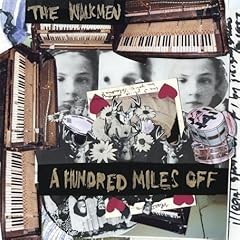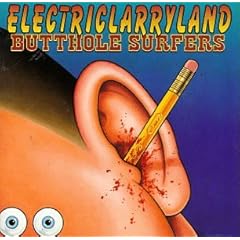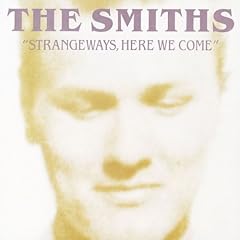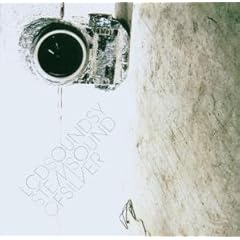The Walkmen - A Hundred Miles Off
The Walkmen - A Hundred Miles Off
by Ian Mathers

When I pitched a defense of this record, Dan asked if I wouldn’t rather knock Bows + Arrows down a peg. I politely declined, partly because I want to mostly talk about their best album, the only truly great one they've recorded yet, not the others. And I simply don’t have much to say about the Walkmen’s other albums. The new You & Me keeps inviting the “return to form” tag, but it seems draggy and formless to me. So maybe the problem is that I don’t like their normal form. Their ostensible peak is actually from Bows + Arrows: “The Rat,” is still a blistering example of I’m-getting-too-old-for-this-town self-loathing. But beyond the rather graceful “Hang On, Siobhan,” the album fails to maintain the intensity and slips past me.
By contrast, I love red-headed-stepchild-by-acclamation A Hundred Miles Off for its confident, muscular ugliness. It’s the rare album that soundtracks the joyously intoxicated night out as well as the next morning's headache. It's frequently atonal, smeared, trebly, possibly overcompressed, and so on. And it is one of my favorite recent rock albums. Hamilton Leithauser pushes his sneer upwards into a painful semi-falsetto and into almost Dylanesque territory, while Matt Barrick absolutely murders his drums (that drumroll in the middle of “Tenleytown” goes on and on until it hurts). This is the album where Peter Bauer and Walter Martin switched instruments (to organs/keyboard and bass, respectively), possibly why they sound fresher here than they ever did.
If you're keen to this manic slop of an aesthetic, the thing's astoundingly solid–no filler in 41 minutes but for a few hazy blobs that advance the post-booze comedown feel. “Louisiana,” the most “accessible” track, eases the flow of caterwaul until Leithauser announces “I got my hands full!” and the horns start parping away. But the echoing “Danny’s at the Wedding” is more indicative of where things are going. The tempo remains distorted (if it exploded, we’d be in “Tenleytown” territory, not the last time this record will circle back around on itself) in a dead, ugly groove, building to Leithauser shrieking out “I really tried my best! I really tried my best!” His voice really is a thing of wonder here; without his piercing vociferation, these songs wouldn’t impact. I can understand why it might only have niche appeal, since that target sound is so messy and difficult.
“Good for You is Good for Me” ups the tempo a little, and brings up the first of several near-thematic mentions of dreaming (“Maybe I'll stop by/ You weren't in the dream I had last night”). The guitar is mostly a rhythmless background blur that gathers momentum as Leithauser croons, “I don’t get some people/ I don’t even try.” The approach bears fruit in “Emma, Get Me a Lemon,” which opens with such a perversely unappealing call for booze-related fixings that only that far-away guitar buzz and Barrick’s circular work make it bearable. We’ve gone from a song about moving in with someone from sheer inertia to something more twisted, impermanent and doomed (“It’s a long way home, let’s enjoy the ride” is as happy as the Walkmen's narrators get).
The fuzzier, indistinct half of the record comes to a head with “All Hands and the Cook,” and the most explicit summing up of the record's perverse belligerence: “Stop talking to the neighbor’s dog/ I got a temper when it’s late/ Break all the windows in my car
Burn down the room when I’m asleep/ Break out the bottles when I go/ I’ll dig a hole for all your friends.” Leithauser sings with less malice than just offhand menace and blustery afterthought. “Don't Get Me Down (Come on Over Here)” is even more direct, Barrick shoving the track forward to give some thrust to Leithauser’s wailed demand to “come on over here.” It’s a song of curdled lust and genuine affection soured by time and ennui.
And it leads right into the impossibly strident “Tenleytown” with a middle break where Barrick does his best to imitate a migraine. The guitars are still kind of distant, albeit doing this great almost-rockabilly figure, as the song makes like the Stooges during the more straightforwardly manic bits of Fun House. I haven’t looked at the waveforms to see how hot they are or anything, but A Hundred Miles Off has a cohesive, distinct sound that would be inadvisable for most artists, yet works wonders for this usually unremarkable unit, shoving the brash unpleasantness of their record right through your ear canal.
Ian Mathers has written for Stylus Magazine, Village Voice, PopMatters and the world's biggest Philip K. Dick fan site. He is currently finishing his Master's degree in Philosophy at the University of Guelph and wishes he had more time to write about music.
by Ian Mathers

When I pitched a defense of this record, Dan asked if I wouldn’t rather knock Bows + Arrows down a peg. I politely declined, partly because I want to mostly talk about their best album, the only truly great one they've recorded yet, not the others. And I simply don’t have much to say about the Walkmen’s other albums. The new You & Me keeps inviting the “return to form” tag, but it seems draggy and formless to me. So maybe the problem is that I don’t like their normal form. Their ostensible peak is actually from Bows + Arrows: “The Rat,” is still a blistering example of I’m-getting-too-old-for-this-town self-loathing. But beyond the rather graceful “Hang On, Siobhan,” the album fails to maintain the intensity and slips past me.
By contrast, I love red-headed-stepchild-by-acclamation A Hundred Miles Off for its confident, muscular ugliness. It’s the rare album that soundtracks the joyously intoxicated night out as well as the next morning's headache. It's frequently atonal, smeared, trebly, possibly overcompressed, and so on. And it is one of my favorite recent rock albums. Hamilton Leithauser pushes his sneer upwards into a painful semi-falsetto and into almost Dylanesque territory, while Matt Barrick absolutely murders his drums (that drumroll in the middle of “Tenleytown” goes on and on until it hurts). This is the album where Peter Bauer and Walter Martin switched instruments (to organs/keyboard and bass, respectively), possibly why they sound fresher here than they ever did.
If you're keen to this manic slop of an aesthetic, the thing's astoundingly solid–no filler in 41 minutes but for a few hazy blobs that advance the post-booze comedown feel. “Louisiana,” the most “accessible” track, eases the flow of caterwaul until Leithauser announces “I got my hands full!” and the horns start parping away. But the echoing “Danny’s at the Wedding” is more indicative of where things are going. The tempo remains distorted (if it exploded, we’d be in “Tenleytown” territory, not the last time this record will circle back around on itself) in a dead, ugly groove, building to Leithauser shrieking out “I really tried my best! I really tried my best!” His voice really is a thing of wonder here; without his piercing vociferation, these songs wouldn’t impact. I can understand why it might only have niche appeal, since that target sound is so messy and difficult.
“Good for You is Good for Me” ups the tempo a little, and brings up the first of several near-thematic mentions of dreaming (“Maybe I'll stop by/ You weren't in the dream I had last night”). The guitar is mostly a rhythmless background blur that gathers momentum as Leithauser croons, “I don’t get some people/ I don’t even try.” The approach bears fruit in “Emma, Get Me a Lemon,” which opens with such a perversely unappealing call for booze-related fixings that only that far-away guitar buzz and Barrick’s circular work make it bearable. We’ve gone from a song about moving in with someone from sheer inertia to something more twisted, impermanent and doomed (“It’s a long way home, let’s enjoy the ride” is as happy as the Walkmen's narrators get).
The fuzzier, indistinct half of the record comes to a head with “All Hands and the Cook,” and the most explicit summing up of the record's perverse belligerence: “Stop talking to the neighbor’s dog/ I got a temper when it’s late/ Break all the windows in my car
Burn down the room when I’m asleep/ Break out the bottles when I go/ I’ll dig a hole for all your friends.” Leithauser sings with less malice than just offhand menace and blustery afterthought. “Don't Get Me Down (Come on Over Here)” is even more direct, Barrick shoving the track forward to give some thrust to Leithauser’s wailed demand to “come on over here.” It’s a song of curdled lust and genuine affection soured by time and ennui.
And it leads right into the impossibly strident “Tenleytown” with a middle break where Barrick does his best to imitate a migraine. The guitars are still kind of distant, albeit doing this great almost-rockabilly figure, as the song makes like the Stooges during the more straightforwardly manic bits of Fun House. I haven’t looked at the waveforms to see how hot they are or anything, but A Hundred Miles Off has a cohesive, distinct sound that would be inadvisable for most artists, yet works wonders for this usually unremarkable unit, shoving the brash unpleasantness of their record right through your ear canal.
Ian Mathers has written for Stylus Magazine, Village Voice, PopMatters and the world's biggest Philip K. Dick fan site. He is currently finishing his Master's degree in Philosophy at the University of Guelph and wishes he had more time to write about music.
Labels: Ian Mathers








